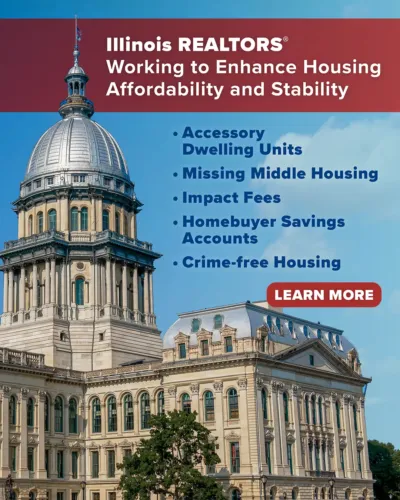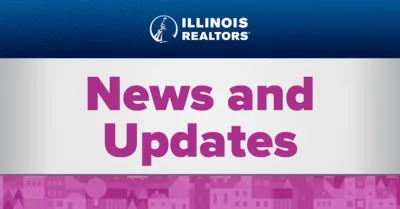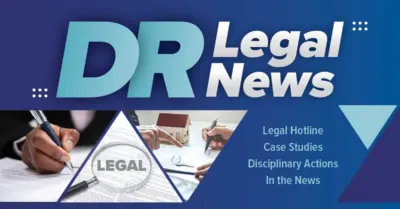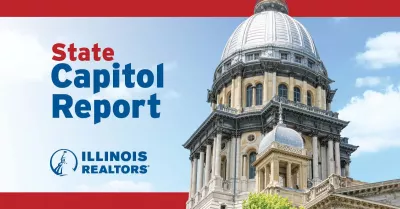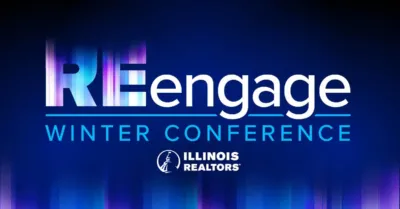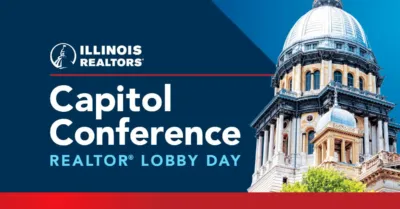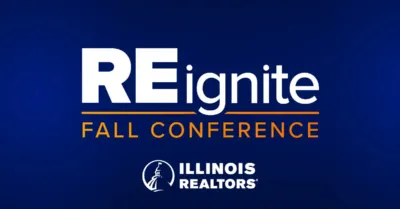New Year, New Laws
A new year brings a series of new laws that could affect your real estate business in 2025, from flooding disclosures on rental leases, updates to the Real Estate License Act, rules to prevent landlord retaliation, guidelines for reusing tenant screening reports and more. Most of the new laws in this article are at the state level but there is a new federal requirement related to filing disclosures with the Department of Treasury that you should also know about.
Jump to a law
- New Federal Reporting Rules for Real Estate Corporations
- SB 2601 – Disclosure of potential flooding in rental and lease agreements
- HB 3740 – Real Estate License Law
- SB 3421 – Amends the Illinois Power of Attorney Act
- HB 4768 – Landlord Retaliation
- HB 5502 – Condominium Property Act Changes
- HB 4926 – Reusable Tenant Screening Report
- HB 5371 – Human Rights – Various
- SB 3652 – Summary of Rights for Safer Homes Act
New Federal Reporting Rules for Real Estate Corporations
In response to growing concerns over criminal organizations utilizing a domestic entity (such as a corporation or LLC) as a shell company to launder money, Congress passed the Anti-Money Laundering Act and Corporate Transparency Act in 2021. Aimed at increasing coordination and information
sharing between investigative and enforcement agencies to strengthen the federal government’s ability to prosecute illicit money laundering operations, the Corporate Transparency Act will require all domestic and foreign entities doing business in the United States to file a disclosure with the Department of Treasury’s Financial Crimes Enforcement Network (FinCEN) that identifies all persons who are “beneficial owners” of a “reportable company.” The Act defines these terms as:
“Reportable Company”
- A corporation, LLC, or other similar entity that is created by the filing of a document with a secretary of state or a similar office under the law of a State or Indian Tribe or formed under the law of a foreign country and registered to do business in the United States by the filing of a document with a secretary of state or similar office under the law of a State or Indian Tribe.
- There are a number of exceptions to this definition, including, but not limited to:
- Political organizations
- Entities who are already regulated for purposes of tracking and deterring money laundering, such as banks and other financial institutions
“Beneficial Owner”
- An individual who has 25 percent or more ownership interest in the entity; or
- An individual who, directly or indirectly, through any contract, arrangement, understanding, relationship, or otherwise, exercises substantial control over the entity.
There are some exceptions to the definition of “beneficial owner,” including:
- Minors
- Persons acting on behalf of another individual such as agents and custodians
- Employees
- Those whose only interest in the entity is through a right of inheritance
- Creditors of the entity
If a reportable company existed prior to Jan. 1, 2024, they must register with FinCEN prior to Jan. 1, 2025.
If a reportable company was formed after Jan. 1, 2024, they must register with FinCEN within 30 days of when they are formed.
Real Estate Report
In addition to the new FinCEN reporting requirements, beginning Dec. 1, 2025, certain real estate professionals involved in real estate transactions that the government considers “high-risk” transactions must file a Real Estate Report with FinCEN.
What are high-risk transactions?
The Department of Treasury has defined a “high-risk transaction” as a non-financed transfer of ownership interest in residential real property to an entity or trust.
“Residential real property” includes single-family residences, townhouses, condominiums and cooperatives (including in large buildings), and buildings designed for one to four family units. Vacant land that is purchased with the intent to build a residence may also be included in the definition.
- It’s important to note that this definition includes a property that might also have a commercial element, such as a single-family residence located above a commercial space.
What is a “transfer” of residential real property?
- Any transfer of an ownership interest in residential real property that is demonstrated through a deed or, for an interest in a cooperative housing corporation, through stock, shares, membership, a certificate, or other contractual agreement evidencing ownership.
- Consideration (i.e. payment) is not necessarily a determining factor. So, gifting a property (unless such a gift is otherwise exempt, such as an estate), could be included.
What is “non-financed” transfer of residential real property?
- A transfer that does not involve an extension of credit to all transferees (buyers), that:
- Is secured by the transferred property
- Is extended by a financial institution subject to other current Federal reporting requirements.
- Essentially, they’re saying “we already know about it through other means”
- If you’re not sure if your lending institution meets the requirements to be exempted from your reporting requirement, reach out to the lending institution to be sure.
Some types of transfers are exempted and are not reportable. These exempt transactions include:
- A transfer that is a grant, transfer, or revocation of an easement
- Transfers resulting from the death of an individual
- Transfers incident to a divorce, dissolution of marriage, or civil union
- Transfers made pursuant to a bankruptcy
- A transfer supervised by a Court
- A transfer made for no consideration (i.e. payment), made by an individual, or spouses, to a trust of which that individual or spouse are the settlors or grantors.
- Transfers to a qualified intermediary for the purposes of a like-kind exchange, commonly referred to as 1031 exchanges.
- Transfers for which there is no reporting person.
What is a “transferee entity” (buyer) in a reportable transfer?
- Any person other than a transferee (buyer) trust or an individual. Examples include:
- A corporation
- A partnership
- An estate
- An association
- An LLC
- Entities otherwise regulated by certain laws such as federal money laundering regulations may be exempt.
- e. Banks and other financial institutions
Who has to report this? Who is a “reporting person”?
- Can be identified in one of two ways:
- The “reporting cascade”
- Written designation agreement
- What is the “reporting cascade”
- The rules set out a list of potential reporting persons, in descending order of who needs to report. If the first listed isn’t a part of the transaction, or has a written designation agreement with someone else on the list, then the reporting obligation “cascades” down to the next person on the list.
- The “cascade”
- The person listed as the closing agent or settlement agent on the closing or settlement statement
- The person that prepares the closing or settlement statement
- The person that files the deed or other instrument of transfer with the recorder
- The person that underwrites a title insurance policy for the transferee
- the person that disburses the greatest amount of funds in connection with the transfer
- the person that provides an evaluation of the status of title
- the person that prepares the deed or any other legal instrument that transfers ownership of the property.
- This includes, with respect to shares in a Cooperative housing corporation, the person who prepares the stock certificate
- FinCEN argues that this “cascade” is modeled after a similar reporting cascade associated with IRS 1099 forms.
- If nobody in the “cascade” is part of the transfer, then a report is not required to be filed.
What information is in this report?
- Information necessary to identify:
- the reporting person
- The residential real property being transferred
- The transferor (seller)
- The transferee entity or trust (buyer)
- The individuals representing the entity or trust in the transfer
- The beneficial owners of the entity or trust to whom the property is being transferred
- The total consideration paid for the property
Who are the beneficial owners of a transferee entity?
- An individual who, on the date of closing, either directly or indirectly
- Exercises substantial control over the transferee entity; OR
- Owns or controls at least 25 percent of the transferee entity’s ownership interests
Who are the beneficial owners of a transferee trust?
- An individual who, on the date of closing:
- Is a trustee
- Otherwise has authority to dispose of trust assets
- Is a beneficiary who is the sole permissible recipient of income and principal from the trust or who has the right to demand a distribution of, or to withdraw, substantially all of the assets of the trust
- A grantor or settlor who has the right to revoke the trust or otherwise withdraw its assets
- Is the beneficial owner of a legal entity or trust that holds one of the positions described in the other categories, unless otherwise exempted
When must this report be filed?
- A Real Estate Report must be filed by the last day of the month following the month in which the date of closing occurred, or 30 days after the date of closing…whichever is later. So, generally anywhere from 30-60 days after the date of closing.
What records must be kept after reporting?
- The reporting person must maintain a copy of the certification by the transferee or transferee’s representatives as to the identities of the beneficial owner of the transferee, as well as any designation agreement, for a period of FIVE YEARS.
- Other than maintaining in some form the information above, the reporting person is not required to maintain a copy of the actual Real Estate Report (unless that is the only way you still have the information)
- Beyond just the reporting person, any party to a designation agreement must retain a copy of the designation agreement for a period of five years.
If this all seems extremely complicated and burdensome, you might be asking yourself: “Can the government make me do this? Is this new law is constitutional?”
Maybe. Maybe not.
Numerous lawsuits have been filed throughout the country challenging the federal government’s authority to enforce this new law.
- On Dec. 3, 2024, a Federal District Court Judge in Texas entered a nationwide preliminary injunction, preventing the federal government from enforcing these requirements while that case proceeds on the merits.
- The Federal Government appealed the entry of this preliminary injunction, and on December 23, 2024, a three judge “motions panel” of the Fifth Circuit Court of Appeals stayed (or stopped) the preliminary injunction while the case is being appealed.
- Following the Fifth Circuit motion panel’s decision to stay the injunction, which re-instituted the requirement to file by January 1, 2025, the Federal Government extended the January 1, 2025, filing deadline to January 13, 2025.
- On December 26, 2024, however, the Fifth Circuit Court of Appeals vacated the stay issued by its motions panel. Noting that a merits panel (which is the three judge panel that will hear the appeal on the merits and is separate from the motions panel of judges) is set to hear the matter on an expedited appeal within the next few weeks, the Court vacated the stay of the injunction “in order to preserve the constitutional status quo while the merits panel considers the parties’ weighty substantive arguments.”
- On December 31, 2024, the Federal Government filed an appeal with the U.S. Supreme Court to stay the injunction while the case is being argued and appealed on the merits. The Supreme Court has not yet ruled on their appeal.
What does that all mean? What am I required to do now?
As of Dec. 27, 2024, the preliminary injunction entered by the Federal District Court remains in place while the case is being appealed to the Fifth Circuit Court of Appeals. While this means that the Government cannot currently enforce any filing requirement or deadline, the Appellate Court has expedited the appeal, and if the Appellate Court eventually rules in favor of the Federal Government, the requirement to file could be put back in place.
BOTTOM LINE: As of Dec. 27, 2024, the Federal Government cannot currently enforce its requirement that “reportable companies” report all of their “beneficial owners” to FinCEN by Jan. 13, 2025, but that requirement could be put back in place pending the Appellate Courts’ ultimate decision.
For those who are or could be affected by this mandated reporting, please stay tuned for further updates.
New Illinois Laws to Know in 2025
SB 2601 – Disclosure of potential flooding in rental and lease agreements
Effective Jan. 1, 2025
Prior to the signing of the lease, a landlord is required to disclose if the property is located in a 100-year flood plain, and if the landlord has any actual knowledge that the rental property, or any of its parking areas, has been subjected to flooding, and if so, the frequency of that flooding.
A landlord leasing a lower-level unit must clearly disclose, in writing prior to signing the lease, to each of the tenants in that lower-level unit whether that unit or any portion of the property containing the lower unit has experienced flooding in the last 10 years, and if so the frequency of the flooding.
The newly enacted law provides standard language for the disclosure, that can be used and attached to the lease in order to meet the requirements of the new law.
If a landlord fails to make the required disclosures, and a tenant subsequently discovers that the property is located in a FEMA 100-year floodplain, the landlord may face substantial consequences. Within 30 days after a tenant becomes aware of the property being located in a floodplain, if such information was not disclosed, the tenant may terminate the lease. If a tenant elects to terminate the lease within the required time, the landlord will be required to return all rent and fees paid in advance within 15 days of receiving notice.
If a landlord fails to make the required disclosure and flooding occurs that damages the tenant’s property, makes the property uninhabitable, OR affects the tenants access to the leased property, the tenant MAY:
- Terminate the lease via written notice within 30 days after the flood occurred. If the tenant elects to terminate, the landlord is required to refund all rent and fees paid in advance no later than 15 days after the tenant gave notice of termination; AND
- Bring an action against the landlord to recover damages for any personal property lost or damaged as a result of the flooding.
These new disclosure requirements expressly do not apply to farm leases, concession leases, or rental properties owned or managed by the Illinois Department of Natural Resources.
HB 3740 – Real Estate License Law
Effective Jan. 1, 2025
As Illinois REALTORS® has been updating you throughout the last few months via educational materials and videos, the Illinois Real Estate License Act was amended in 2024 with some changes that are important for you to be aware of.
New requirement for written brokerage agreements
While it has been widely publicized and discussed that the settlement agreement involving NAR required written brokerage agreements beginning in August, it’s important to also know that this requirement was also codified into the Illinois Real Estate License Act. This requirement is expected to be further clarified with administrative rules in the next few months. Some important points to keep in mind:
- The written agreement can be exclusive or non-exclusive
- The written agreement is required when you begin working with a potential client as their designated agent, no later than before the showing or touring of a property
- The requirement applies to all forms of real estate brokerage, including:
- Sales
- Rentals
- Property Management
- Commercial
- If you fail to enter into a written agreement, you could be subject to discipline.
- The pre-license exam for managing broker licensing will now be limited to Illinois specific brokerage laws.
Business Practice Changes:
- All compensation charged by a broker to a client must be disclosed, including amounts that may be paid to a cooperating broker in a transaction
- For employment agreements, where an agreement states that the relationship is that of an independent contractor, then it is an independent contractor relationship for purposes of brokerage activities. The intent of this is to attempt to clarify and protect an independent contractor relationship, when it might otherwise conflict with other State laws.
New continuing education requirements
A six-hour core curriculum will now include a mandatory two hours of fair housing continuing education. While this results in an increase of four to six hours of core curriculum, the total number of hours required in a two-year period remains at 12.
*(Effective Jan 1, 2026) Reciprocal agreements with other states will eventually be phased out and replaced by an endorsement process for out-of-state licensees. The endorsement process will require successful completion of an Illinois-specific exam, for which the Division of Real Estate is currently developing coursework.
SB 3421 – Amends the Illinois Power of Attorney Act
Effective Jan. 1, 2025
In an attempt to help clarify when a Power of Attorney is in an acceptable form, and when it might not, SB3421 amended the Illinois Power of Attorney Act. The changes include:
- Amendments to the Act to state that a third party must honor an Illinois statutory short form power of attorney that has been properly executed in accordance with all laws in place at the time it was executed, if the only reason it would not be honored is because:
-
- The POA is not on a form the third party receiving it usually uses;
- There has been a lapse of time since the execution of the POA
- On its face, there is a lapse of time between the date of acknowledgement of the principals’ signature and the date of the acceptance by the agent;
- The document provided does not bear an original signature, original witness, or original notarization but is accompanied by a properly executed Agent’s Certification and Acceptance of Authority, Successor Agent’s Certification and Acceptance of Authority, or Co-Agent’s Certification and Acceptance of Authority bearing the original signature of the named agent; OR
- The document appoints an entity as an agent.
Nothing in these changes prohibits or limits a third party from requiring the named agent to provide a properly executed Agent’s Certification and Acceptance of Authority, Successor Agent’s Certification and Acceptance of Authority, or Co-Agent’s Certification and Acceptance of Authority.
- Expressly sets forth certain instances in which it might be reasonable for a third party to refuse to honor an otherwise acceptable copy under the Act. These include, but are not limited to:
- An agent refuses to provide an affidavit or properly executed Agent’s Certification and Acceptance of Authority, Successor Agent’s Certification and Acceptance of Authority, or Co-Agent’s Certification and Acceptance of Authority;
- An agent refuses to provide a copy of the original document that is certified to be valid by an attorney, a court order, or governmental entity;
- The person’s good faith referral of the principal and the agent or a person acting for or with the agent to the local adult protective services unit;
- Actual knowledge or a reasonable basis for believing in the existence of a report having been made by any person to the local adult protective services unit alleging physical or financial abuse, neglect, exploitation, or abandonment of the principal by the agent or a person acting for the agent;
- Actual knowledge of the principal’s death or a reasonable basis for believing the principal has died;
- Actual knowledge of the incapacity of the principal or a reasonable basis for believing the principal is incapacitate if the power of attorney tendered is a nondurable power of attorney;
- Actual knowledge or a reasonable basis for believing that the principal was incapacitated at the time the power of attorney was executed;
- Actual knowledge or a reasonable basis for believing: (A) the power of attorney was procured through fraud, duress, or undue influence, or (B) the agent is engaged in fraud or abuse of the principal;
- Actual notice of the termination or revocation of the power of attorney or a reasonable basis for believing that the power of attorney has been terminated or revoked;
- The refusal by a title insurance company to underwrite title insurance for a gift of real property made pursuant to a statutory short form power of attorney that does not contain express instructions or purposes of the principal with respect to gifts in paragraph 3 of the statutory short form power of attorney;
- The refusal of the principal’s attorney to provide a certificate that the power of attorney is valid;
- A missing or incorrect signature, an invalid notarization, or an unacceptable power of attorney identification;
- The third party: (A) has filed a suspicious activity report as described by 31 USC 5318(g) with respect to the principal or agent; (B) believes in good faith that the principal or agent has a prior criminal history involving financial crimes; or (C) has had a previous, unsatisfactory business relationship with the agent due to or resulting in material loss to the third party, financial mismanagement by the agent, or litigation between the third party and the agent alleging substantial damages; OR
- The third party has reasonable cause to suspect the abuse, abandonment, neglect, or financial exploitation of the principal, if the principal is an eligible adult under the Adult Protective Services Act.
HB 4768 – Landlord Retaliation
Effective Jan. 1, 2025
Current landlord/tenant law, known as the Retaliatory Eviction Act, prohibits a landlord from evicting a tenant in response to a tenant complaining to a government entity. In 2024, tenant advocacy groups pushed for a replacement and significant expansion of current law in the original version HB 4768.
After much debate and negotiation, a final pared down version of the new Landlord Retaliation Act was passed and signed into law.
This new law states that a landlord unlawfully retaliates against a tenant if the landlord:
- terminates the lease;
- increases rent;
- decreases services;
- brings or threatens to bring a lawsuit against a tenant for possession; or
- refuses to renew a lease
and does so in response to their tenant taking one of the following actions:
- Complained to a government agency, elected representative, or public official charged with enforcement of certain building or health codes;
- Complained to a community organization of certain building or health code violations other illegal landlord practices;
- Sought the assistance of a community organization to remedy a code violation or illegal landlord practice;
- Complained or requested the landlord to make repairs to the premises as required by law;
- Organized or joined a tenant’s union;
- Testified in court or an administrative proceeding concerning the premises’ conditions; or
- Exercised any right or remedy provided by law.
Potential penalties for violations of this Act can be steep. If a court finds that a landlord violates this law, a tenant may:
(1) terminate the rental agreement. If the rental agreement is terminated, the landlord must return all security deposits and interest recoverable under the Security Deposit Return Act, as well as all prepaid rent;
(2) recover possession of the premises if the landlord has dispossessed, threatened to dispossess, or is in the process of dispossessing; and
(3) seek recovery of an amount equal to and not more than two months’ rent or two times the damages sustained by the tenant, whichever is greater, and reasonable attorney’s fees.
It’s important to note that the Act creates a rebuttable presumption that an action is retaliatory if within one year before the alleged retaliation occurred there is evidence that the landlord’s action against the tenant was in response to any tenant conduct that is protected under the Act. The Act does not clearly define what such evidence needs to be, which might leave that question open to a Court’s interpretation.
As a defense against accusations of retaliation, a landlord can show they are not retaliating by proving a legitimate, non-retaliatory basis for their action; or by proving that they began the action before the tenant engaged in any of the protected activity. All of this could leave a landlord in a position where they must prove it is more likely than not that they are innocent, instead of the way our system typically works where an accuser must prove their accusation is more likely than not to be true. Because of this, best practices would say that if a landlord decides to take action against a tenant, for a legitimate and lawful reason, they should make sure that all steps throughout the process are well documented, including the reasons for why they are taking such actions.
HB 5502 – Condominium Property Act Changes
Effective Jan. 1, 2025
Upon REALTORS® suggestion, and in conjunction with the Community Associations of Illinois, HB 5502 was passed and signed into law, amending the Condominium Property Act to expressly clarify that in a sale of a condominium unit by an owner, no condominium association may exercise any right of refusal, option to purchase, or right to disapprove the sale:
(i) on the basis that the purchaser’s financing is guaranteed by the Federal Housing Administration; or
(ii) for a discriminatory or otherwise unlawful purposes.
Any person aggrieved by a violation of the provisions regarding resale approval has a cause of action against the offending condominium association in circuit court.
HB 4926 – Reusable Tenant Screening Report
Effective Jan. 1, 2025
HB 4926 amends the Landlord and Tenant Act by giving a person applying for housing an ability to use a recently acquired credit report, if certain requirements are met. These requirements include:
- The report was prepared within the previous 30 days by a consumer credit reporting agency at the request and expense of the prospective tenant
- The report is made directly available to a landlord for use in the rental application process or is provided through a third-party website that regularly engages in the business of providing a reusable tenant screening report and complies with all State and federal laws pertaining to use and disclosure of information contained in a consumer report by a consumer credit reporting agency;
- The report is available to the landlord at no cost to access or use; and
- The report includes all of the criteria consistently being used by the landlord in the screening of prospective tenants.
Nothing in this new law prohibits a landlord from collecting and processing an application in addition to the report provided, as long as the prospective tenant is not charged an application screening fee for the purposes of obtaining an additional credit report.
- Does this mean a landlord can now no longer charge a fee for a credit check?
- No, this act only applies if the tenant is providing an already existing, reusable credit report, as defined in the Act.
There may be differing interpretations of this new law among the various credit report companies, and differing business practices implemented by them in response to this new law. As written, this new law merely changes what is allowed, or not allowed, IF a tenant provides a recent report to the landlord that meets all the landlord’s typical, and lawful, standards that they otherwise normally and consistently use when screening potential tenants.
HB 5371 – Human Rights – Various
Effective Jan. 1, 2025
HB 5371 was a heavily negotiated bill that was mainly an initiative of the Illinois Attorney General and the Illinois Department of Human Rights. The overarching intent of the bill was twofold: (1) to clarify that while an action taken may be non-discriminatory or neutral on its face, it might nevertheless result in a civil rights violation if it has the
effect of disproportionately impacting members of a protected class; and (2) expressly grant the Attorney General and an aggrieved party greater ability to seek restitution from persons or entities who commit civil rights violations.
As initially proposed, the bill inserted vague terms into the Illinois Human Rights Act that might leave real estate professionals uncertain as to what it means to “otherwise making unavailable” a property in a real estate transaction in a manner that is discriminatory. After weeks of negotiations, all parties, including Illinois REALTORS®, agreed to remove some of the initially vague language, the bill passed and became effective on Jan. 1, 2025.
Amendments to these types of laws, as applied in real life, can raise the heart rate of many in the real estate industry, so it might help to understand some of the reasoning behind these changes:
- Practices and methods that have the effect of violating someone’s civil rights have long been prohibited. One aim of this bill was to attempt to clarify when and how a claim might be brought by a person or entity that believes there is discrimination occurring as a result of what might otherwise appear to be neutral, non-discriminatory policies.
A new subsection (H) in the Illinois Human Rights Act section dealing with civil rights protections in real estate transactions now expressly states that it is a civil rights violation for any owner or any other person, or for a real estate broker or salesman, to:
- “Use criteria or methods that have the effect of subjecting individuals to unlawful discrimination or discrimination based on familial status, immigration status, source of income, or an arrest record in a real estate transaction. Such criteria and methods are unlawful under this subsection if they are not necessary to achieve a substantial, legitimate, non-discriminatory interest; or if the substantial, legitimate, non-discriminatory interest could be served by another practice that has a less discriminatory effect.”
As a real estate professional who takes pride in upholding fair housing laws and their intent, most, if not all of that should sound familiar, and already be a well-established rule by which you conduct your real estate transactions.
The new Act also:
- Increases penalties for violations;
- Creates a hotline to the Department for those who believe they are being discriminated against; and
- Grants the Illinois Attorney General greater ability to seek restitution for individuals who have been discriminated against by persons or entities who enact or enforce policies that have the effect of discriminating against someone because of their status as part of a protected class.
SB 3652 – Summary of Rights for Safer Homes Act
Law passed in 2024; Effective Jan. 1, 2026
No later than 60 days after the effective date of this Act, the Illinois Department of Human Rights is to prepare a summary identifying key rights and remedies of tenants or household members of tenants who are survivors of domestic violence or sexual violence under various Illinois statutes. The Department is required to format the summary and make it available to the public for copying and use.
Beginning Jan. 1, 2026, landlords will be required to attach the summary to all leases and renewals, obtaining a signature from the tenant acknowledging receipt of the disclosure. If a landlord fails to comply with the disclosure requirements, they may be fined up to $2,000 plus any costs and attorney’s fees a tenant may incur to bring an action.
About the writer: Matthew Rentschler is the Legislative Attorney for Illinois REALTORS®



